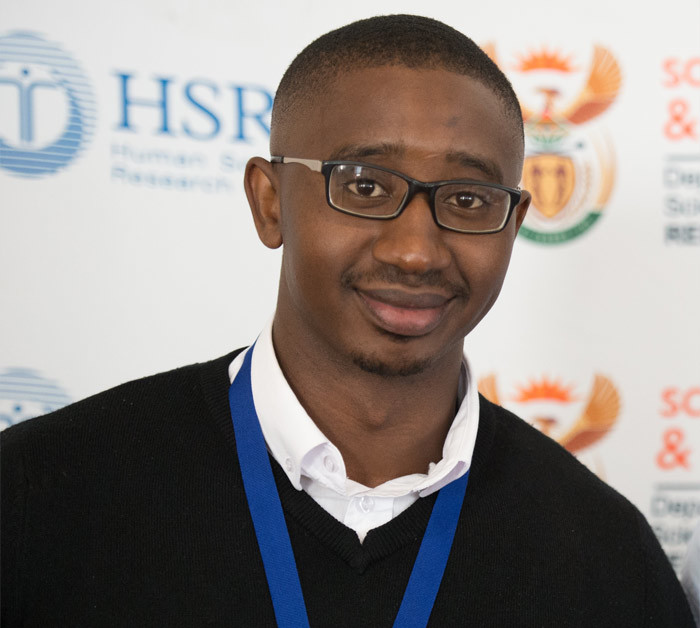Another opportunity to 'seize the day'
04 January 2016 | Story Abigail Calata. Photo supplied.
Development studies graduate Kgaugelo Sebidi faced down impossible odds to pursue his first love - psychology. In the process he discovered an even greater passion for development studies and as a Rhodes scholar will pursue an MPhil in Development Studies at Oxford University.
Q: What has your academic journey been like up to this point?
A: I was born in the East Rand of Johannesburg in a township called Etwatwa (Daveyton). In 2006, my mother decided to send me to Burgersfort, Limpopo to live with my grandmother. At the time, the situation in Daveyton was tough. There was a lot of gangsterism and I also kept bad company. In Limpopo, I attended a very poor school called Kweledi Secondary School. Our classes were under a tree for four weeks in Grade 8. We also had to bring our own chairs to school. Growing up in a rural area at such a critical time humbled me and that was where my moral integrity emerged. In 2010, our matric class was composed of 19 students. Unfortunately only three students did well enough to qualify for tertiary education. I was one of them.
In 2011, I took an unintentional gap year and returned to Daveyton. I started to make regular visits to the Jerry Moloi Library. It was here I fell in love with psychology. I applied to do a BA in Psychology at UJ (University of Johannesburg), was accepted and started my academic career in 2012. At UJ I worked very hard. I was really thirsty for knowledge. Plus, the university was well resourced. I was able to thrive and obtain my degree cum laude. I fell in love with development studies in the latter part of 2014 - it was my second major.
I applied for an honours programme and became a Harry Crossley Fellow at UCT. A year later, here I am a UCT graduate heading to Oxford as a Rhodes Scholar. It's been very tough, but very fulfilling as well.
Q: What drives you?
A: I was introduced to the phrase Carpe Diem (seize the day) by a psychology professor at UJ in my first year. I come from a socioeconomic background that was not conducive to building self-confidence. A lot of things that I have achieved mostly came as a result of my own personal leadership. I have had to lead myself out of particular situations into other situations where I have embraced many obstacles and challenges - but all of them have strengthened me. In sum, I am driven by seizing opportunities and embracing challenges.
Q: Who inspires you?
A: My grandmother inspires me. My mother had me when she was 17 years of age, and my grandmother was the person who was always there for me. She is always willing to share her knowledge and wisdom.
One Sunday morning my grandmother as usual went to church. While she was away, I cleaned our two-roomed house and cooked her favourite meal. Upon her return she noticed I had cleaned the house and she enjoyed the meal I had cooked. What worried me was her luke-warm response to all my hard work. I decided to confront her about it. She sat me down and said, "Kgaugelo, everything that you do in life is for your own good."
That statement continues to inspire me because it also translates to the personal leadership that I previously noted. Usually, we speak of leadership in a way that implies that a leader automatically has followers. We downplay personal leadership. Though difficult and problematic, self-leadership can be transformed into other types of leadership.
Q: Why did you apply for the Rhodes Scholarship?
A: It's important for us (as youth) to expose ourselves to different opportunities. I just applied for it like I applied for many other scholarships. I took the chance. I seized the day.
I knew about the scholarship and what it required. And I had seen the positive impact that many Rhodes scholars have made in the world. I have always known that I want to make an impact for change in the very same manner. So I applied for the scholarship because of its investment in young leaders who have the potential to contribute towards the noble fight.
Q: What do you hope to achieve through your involvement in this programme?
A: In Oxford I will be reading for an MPhil in Development Studies. Of course Oxford University is widely known as one of the most prestigious universities in the world, and the Department of International Development is highly respected.
More than anything, what I would like to achieve is personal, academic and leadership growth. Education is an important aspect of identity formation. I am not going to the UK to be indoctrinated by their values and cultures. My biggest achievement would be to come back and share the knowledge and expertise I acquired so as to further the socioeconomic agenda in South Africa and Africa.
Q: Do you feel any ambiguity in accepting this scholarship?
A: I am a huge supporter of the Rhodes Must Fall Movement (RMF). However, I do not feel any ambiguity in accepting this scholarship. In my view, RMF and the Rhodes Scholarships both seek transformation. The Rhodes Scholarship seeks transformation through investing in young individuals who have the instincts to lead and also possess the potential to contribute greatly to society.
RMF on the other hand, seeks transformation through being critical of the status quo in matters of higher education and coloniality (how colonialism continues to manifest itself through modernity). We need to appreciate that both entities are good for humanity and thus they can coexist (as juxtaposed as they may seem) because transformation is at the core of both their aspirations.
 This work is licensed under a Creative Commons Attribution-NoDerivatives 4.0 International License.
This work is licensed under a Creative Commons Attribution-NoDerivatives 4.0 International License.
Please view the republishing articles page for more information.










